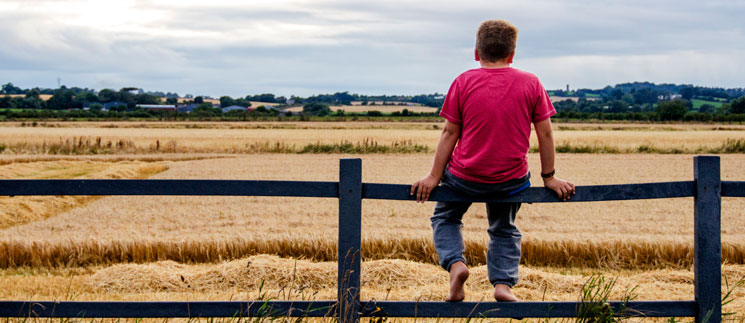Back when I started this site I’ve read what was probably a library worth of articles on mindful living and experiencing the benefits of living in the moment. It took about three years though to finally start taking this thing seriously and give it the extended treatment and attention it deserves.

For a time, I was honestly thinking that I knew what it was to live in the moment. And majority of you reading this share the same notion. Just go ahead and ask ten people on whether they think they are fully experiencing the present moment, and chances are that nine will agree within a second.
This gives a glimpse on a fact that none of us is welcoming with ease. Not only that we are less mindful, but it is hard to recognize such behavior as well.
This article will explain why the anomaly and give you an easy step by step guide on how to become more mindful. We are covering basics here, but even with this knowledge you will be far better off.
All you need to know about mindfulness right now
Being mindful means not getting yourself distracted away from the present moment. Focusing on the here-and-now, there is much to be savored and enjoyed.
However, only few people try to focus and remain present. Most of us are carried away by frantic thought, reminiscing about the past, or always being preoccupied with the future. We over-analyze things, obsess over hypothetical scenarios, and are all but present.
Being more mindful allows a greater freedom of the mind. Unshackling it from frantic thoughts, it allows the mind to focus more, to be more creative, more aware, to experience a greater sense of joy.
Cluttering the mind, due to habit, has become a daily practice of ours. Research suggests that 40% of the time we are not focusing on the here-and-now, and instead let frantic thought sweep us away. The fast paced society we are all part of, serves only to increase this number.
What is important to know and understand, is that living away from the present moment is a habitual practice. And as everything else when it comes to habits, it can be turned around and reconditioned.
The rest of the article will show you exactly how to achieve this.
How to become more mindful - change these three habits first
Before you continue with the exercises, let me make sure you understand this- becoming more mindful is a process. And it is very likely to go smooth for a while, though at times you might experience some difficulties. The important thing to remember is that you must stick with the process and be at ease with casual ups and downs.
After all, you had a lifetime of practice to live outside the present moment- so give this process some time, will you?
So what are the three things you need to get rid of first, should you like to experience more mindfulness?
Never be in a hurry
Very easy to say, but not so much to apply as a daily practice- It seems as though we are always in some sort of a hurry. If we somehow manage to keep our bodies and body language still and calm, then our minds are racing.
Being in a hurry, multitasking, planning what to do next- these are all products of a habit that you’ve managed to reinforce over time. A habit that creates restlessness, anxiety, and most of all inability to fully experience the present moment- which in turn only adds fuel to the previous ones.
For the sake of this exercise, try and become more still. When you eat- eat; when you watch a movie- watch a movie; when you take a shower- take a shower. Don’t allow the sense of urgency and restlessness to creep in. Keep things relaxed in the physical world, and train the mind to follow as well.
Don’t allow your mind to go on autopilot
Whether this means singing a song over and over throughout the length of the day, going over numbers from work, or obsessive thoughts the moment you have a chance…
Many people, and you’ve probably noticed this at one point or another, are quite afraid of being alone with themselves. This is usually because then the mind goes wondering on autopilot, and the process itself is not very much pleasant. Trying to avoid it, many people subscribe to obsessively checking the phone, listening to music, or keeping themselves busy in any way imaginable.
Here is the trick though- Regardless of how painful it might seem at first (and it will, believe me), try to spend more time just being with yourself.
The moment you catch your mind going on autopilot, make it stop. Checking stats, social media accounts, your phone… as long as these are not intentional, make it a habit not to do them.
Stop yourself from escaping the moment
Trying to focus on the present moment doesn’t necessarily mean stopping whatever thoughts or emotions you might experience. It means being more curious about what you do now, while letting everything else pass by. Every thought or emotion coming up is not a problem, as long as we are letting it go.
At first, staying with the present moment might seem dull and slightly boring- don’t worry though, being used to constant stimuli and streams of thoughts to keep us distracted, it is normal to feel slightly bored when focusing on the here-and-now.
Incorporate these three exercises in your life, and see a change within a week
The usual measurement of mindfulness you ought to be using is not trying to rank yourself somewhere between a constantly distracted person and a Buddhist monk. This being a process, the advice goes to keep track on whether or not you are doing your best throughout the day, each day, and nothing more.
Here is how to dramatically improve within a week.
Meditation

Starting out with just ten minutes per day, you will experience a huge shift in awareness. At first it might feel somewhat uncomfortable, but the more you stick with it the more you will find it to be relaxing to the mind.
Meditation is not about stopping thoughts, but instead letting them appear and pass by. It is about teaching us how to relate to our thoughts and feelings, without trying to neither stop them nor change them.
Try the headspace app which allows for ten free sessions of guided meditation, and then, if you find it to be relaxing, subscribe for a month ahead.
Three deep breaths
Being more mindful is all about being present in the here-and-now. And we sometimes forget all about the here-and-now.
Try this for couple of days. Whenever you finish your meditation, just pause and take three deep breaths. Then, simply think about what you are going to do next and take another three breaths again.
This will force you to be more present in the moment and the activity at hand.
Continue with this practice even outside your meditation. This way, by reminding yourself to be present, the focus will remain throughout the day.
Take three deep breaths before you start your commute, before you enter the shower, before you eat your breakfast, and before you start typing on your desk… As time goes by, try and add more activities to the list. Don’t try this exercise with everything that you do though, since at first it will only create additional restlessness and anxiety; start small, and then, when you feel like it slips into a habit, add another activity as well.
I’ve found that it helps me deal better with demanding activities such as exercise and tackling large work projects. So, the moment before shifting my attention, I’d pause, take three deep breaths, and move on to the activity. Last month, for example, I had to review a popular workout program which meant doing some of the challenging routines one day after another. Considering my workload for the week, the task was exhausting at it was causing me some stress. Nevertheless, I persisted with the schedule, and used this technique every time before tying my shoes and hitting the play button. And what do you know - the week has went away and I’ve successfully completed the program, and with it the Daily Burn review. If you are struggling with exercise, definitely consider this technique.
Enjoy and explore each sensation
Just as with meditating, try to investigate every sensory feeling. Try to taste food, to become curious about the way a hot shower feels. Try to stay long enough with each sensation, and even explore the negative ones. Staying long enough with things like fear, anxiety and stress- you will notice a huge relief in the way they make you feel. Exploring feelings, emotions, senses- you will experience them more, and become able to relate to them in a different way. To either enjoy what you like, or let go of what you feel bad about.
Mindfulness, ultimately, offers just that- to be present in the moment, while not tying yourself to a particular emotion or thought. It allows you to experience more joy, and learn how to coexist with unpleasant feelings. It offers a chance to put more intention behind your actions and thoughts- becoming more creative, calm and happy in the process.